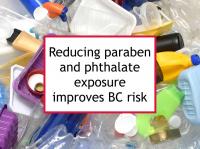Phthalates and parabens are classes of chemicals used in packaging and personal care products. Cell and animal studies have demonstrated that these chemicals cause changes that could promote breast cancer. Now a new study has reported that unfavorable pre-cancerous changes can be reversed by reducing exposure to parabens and phthalates.
Paraben exposure
Parabens (alkyl esters of p‐hydroxybenzoic acid) are a class of chemical compounds widely used as preservatives in cosmetics and personal care products, as well as in pharmaceuticals and some processed foods. Parabens can be absorbed into circulation through the skin. In other words, parabens can penetrate human skin intact and be absorbed systemically. The most common parabens used in consumer products are methylparaben, ethylparaben, propylparaben, butylparaben and isobutylparaben.
Phthalate exposure
Phthalates are chemicals used primarily as plasticizers of polyvinyl chloride. Plasticizers impart flexibility and resilience to plastics. Phthalates also are used as solubilizing or stabilizing agents in some personal care products. Food packaging and lotions and creams are the main sources of phthalate exposure for most people. Phthalates such as diethyl phthalate (DEP) and dibutyl phthalate (DBP), which are used in lotions and creams, can be absorbed through the skin.
Latest research shows benefits of avoiding parabens & phthalates
The study referenced above was designed to investigate the effects of eliminating personal care products containing parabens and phthalates on breast tissue in cancer-free women. To conduct the study, the authors developed a regimen of reduced xenoestrogen use (REDUXE) by substituting paraben- and phthalate-free personal care products.
Study participants adopted the REDUXE intervention for 28 days. Pre- and post-intervention fine needle aspirates of the breast were collected in order to capture the consequences of exposure at the molecular and cellular level. Reduced exposure was confirmed by lowered urinary excretion of paraben and phthalate metabolites.
Substituting paraben- and phthalate-free personal care products using the REDUXE intervention was found to result in a remarkable reversal of cancer-associated phenotypes (including the PI3K-AKT/mTOR pathway, autophagy, and apoptotic signaling networks) within participants' breast cells. Additional studies demonstrated that REDUXE had a beneficial impact on gene expression within known 17β-estradiol (E2)-modulated pathways and functional endpoints (including estrogen receptor alpha to beta ratio and S-phase fraction of the cell cycle).
The authors conclude that avoiding paraben- and phthalate-containing personal care products has the potential to contribute to breast cancer prevention by suppressing pro-carcinogenic phenotypes at the cellular level.
Please see our parabens tag and article on phthalates for more information.
